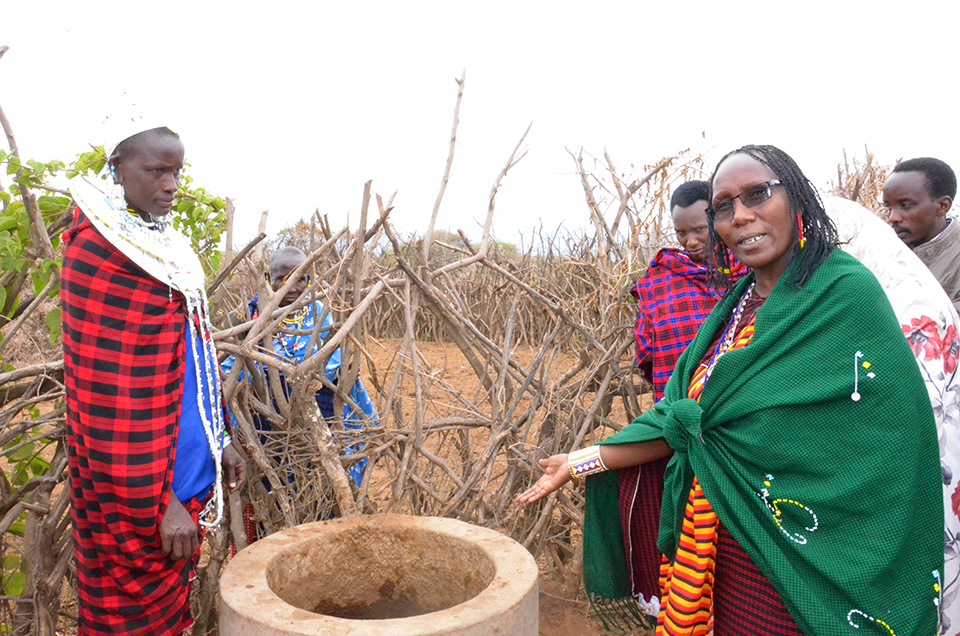UN Women Supports Maasai Women-led Enterprises to Respond to COVID-19 in Tanzania
Date:

The Ngorongoro district in Arusha region is a land of craters, sacred forests and mountains, wild animals and the Maasai people. This community has learnt to co-exist with nature, sharing land, wild food, herbs and water with the wild animals that roam freely.
Rosemary Satunini Berere, 23, grew up in Samunge village where each morning while fetching water at a nearby river, she would see majestic giraffes and other grazers, feeding amid the rising sun.
However, in March 2020, life took a nasty turn in her village following an outbreak of COVID-19, a pandemic that has led to global efforts to contain the spread.
Most lodges in Ngorongoro temporarily closed or scaled down business following the cancelation of tourist bookings. As these accommodation facilities were her major market, this affected her organic vegetable business which she established after receiving business training from the Pastoral Women’s Council (PWC) in partnership with UN Women in 2018. This programme which is called ‘Empowering Adolescent Girls and Young Women through Education in Tanzania, is funded by the Korea International Cooperation Agency (KOICA).
It started in 2016 and will run through 2021 and has so far trained 100 adolescent girls and young women in both life and technical skills. The trainings focused on green renewable energy businesses such as domestic solar panel installation, maintenance and marketing of the products and construction of domestic biogas plants. It also imparted micro-revolving financing and income generating group-formation skills.
However, following the setback caused by COVID-19, Rosemary was left with the option to sell her vegetables around her community while she searches for other market opportunities in other regions and some neighbouring countries.
“I am looking at sourcing new markets, including selling to people in the food business outside the Arusha region and beyond Tanzania. However, my challenge is how to access information on the available opportunities in some neighbouring countries that may be experiencing shortages in various supplies including organic vegetables due to lock-down restrictions,” says Rosemary.
Following the news of additional support from UN Women, she has started increasing production to introduce new vegetable varieties and says she would like to sell more and boost her savings to buy a water pump for irrigation.
Rosemary is not the only young woman seeing business opportunities amid the global pandemic and also taking advantage of Tanzania’s partial restrictions against COVID-19, a situation that has kept some sectors of the economy open.
Many out-of-school pastoral young women and adolescent girls are also innovating their small businesses to survive the multiplier-effects of the pandemic on the tourism sector and are looking at doing business beyond their region.
Through the first phase of the intervention package in response to COVID-19, UN Women has set aside USD 60,000 through the Education Program funds from KOICA, to provide small grants that will support economic innovations aimed at helping to keep the young women’s businesses afloat.
Hodan Addou, the UN Women Representative in Tanzania, says the initiative targets 100 out-of-school adolescent girls and young women who had established their businesses through the Empowering Adolescent Girls and Young Women through Education Program.
According to Ms. Addou, the intervention comes after the COVID-19 pandemic has reduced business activity in the informal sector, which provides livelihoods to more than 50 percent of women in Tanzania.
The low access to productive resources such as land and livestock, she explains, also means the young women and adolescent girls are unable to diversify their incomes and livelihoods in areas such as Ngorongoro.
The trainings supported by UN Women, she adds, also prepared the young women and girls for emergencies such as COVID-19.
“This is still part of the Education Program supported by KOICA and we have allocated part of funds to support struggling businesses that depend mainly on the tourism industry in Ngorongoro. The small grants will support our efforts to promote the rights, needs and agency of women and girls,” says Ms Addou.
Through the grants, some of the young women and girls will buy smartphones to support access to new business markets and online information and help others to promote other initiatives aimed at strengthening business-resilience for quick recovery from COVID-19.
The PWC Executive Director, Maanda Ngoitiko emphasized the importance of socio-economic empowerment of pastoral women and girls to support gender equality efforts in Ngorongoro. “This remains our key focus and through the support from UN Women, we can contribute towards boosting the livelihoods of women and girls and cushion them from the negative impact of the coronavirus disease. We would like to see the adolescent girls and young women economically independent and believe this will support our efforts to reduce their vulnerability to gender-based violence,” Ms Ngoitiko says.
For young women such as Lucy Willium Lembikas, who also benefitted from the UN Women and PWC Education Program, the pandemic has forced them to push the boundaries and think outside the box for their businesses to survive the pandemic. The 25-year-old single mother from Kirtalo village, Loliondo in Ngorongoro has set her eyes on expanding her crafts business to the commercial city of Dar es Salaam, where she will also be selling solar products and providing solar-maintenance services.
“Following the training, there is a lot I can do now, including applying my new skills to plan the expansion of my business. Again, I would like to thank UN Women and PWC for the business grant initiative, which came at a time when I was working on my business plan to increase the production of jewellery for the Dar es Salaam market. The smartphone will help me in advertising my new products and to market the solar business online using social media platforms,” says Lucy.